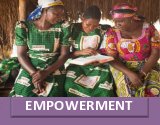
|
Stonecroft
Stonecroft Training
Adult English Trinity SeriesYouth English Trinity SeriesTrinity Series InternationalThe International Team
ATBSYDT TeachingsEvangelismUCT English Curriculum |
home >>stonecroft
>> facilitating a bible study
FACILITATING A STONECROFT BIBLE
STUDY
We encourage Guides to bring together people from a variety of faith backgrounds, as our studies are designed to draw people to God’s Word for answers. Here are a few important considerations when training a Stonecroft Bible Studies Guide. A Few Tips to Get Started • Always provide an environment that is safe! • Establish respect and confidentiality guidelines at the beginning of the study, being non-judgmental, open, and accepting. • Establish the opportunity for the relationships in the group to develop into a caring community. • Provide clear directions to the group. Make sure those who have never been in a Bible study feel safe to assimilate in this type of group. • Keep the discussion “on track.” Sometimes it is difficult to interrupt, though you often might need to gently interject, so the conversation does not go on a rabbit trail. • Keep moving forward, but also be aware of those unique opportunities the Lord is using to share at a deeper level. • Be flexible and expect God to work, not only in each person represented, but also in the community itself. Be in constant prayer for those in your group. Creating an Environment for Learning and Sharing • Maintain and build feelings of self-confidence and self-worth. • Acknowledge ideas, comments, and responses in a sincere and specific manner by restating what the person did or said and why it was effective. Remember when someone does not have a faith background or knowledge of Scripture, she may say some things that are not necessarily accurate, but you can still acknowledge, affirm, and support • Use a variety of statements to praise participants. Using the same phrase too often (such as “Great job!”) could cause your sincerity to be questioned. Consider taking a few words from her sentence and repeating it back. "I really liked what you said about. . . ." • When correcting or clarifying, take the focus off the individual and put it on the situation. Listen and seek to understand the participants. • Listen to the entire message before responding; do not interrupt. Remember you are there to serve, encourage, and support participants. Be careful not to represent yourself as the authority. • Be a non-judgmental listener—concentrate on what participants are saying instead of whether you agree or not. Affirm what you can affirm, and then turn the question to someone else. • Be aware of nonverbal messages participants are sending. A frown or not making eye contact could indicate more clarification is needed. Feel free to ask, "I can tell you have something on your mind. What are you thinking?” Encourage involvement. • Call on specific participants only when you are asking for an example or opinion. Think about open-ended conversations, such as, "What are your thoughts?” “How do you feel about…?” “Give me an example.” “Tell me more about that.” These simple questions or statements can be very helpful to encourage dialogue. • When asking questions of the group, wait at least a few seconds for someone to respond. This gives participants time to think. • If you believe that someone prefers not to share, respect that. Do not put people on the spot; though also try to open them up. The more they share without a negative reaction, the more they will trust the group dynamics. • Keep the discussion “on track.” Sometimes you may need to gently interject when the conversation is dominated by one person. Be aware of those unique opportunities the Lord is using to share at a deeper level. Additional Tips to Ensure a Meaningful Experience • Feel free to rephrase questions if it would be helpful for understanding. Use open-ended questions, rather than those that can be answered “yes” or “no.” • Someone whose life experience relates to the study could be invited to share a brief testimony of what God has taught her or how He has been real in her life. • Keep the focus of the study on Jesus Christ. • If needs are expressed that may indicate the need for counseling, approach the person privately. Encourage her to seek godly counsel. DISTRACTIONS AND DISRUPTIONS John 12:32, NLT Stonecroft Ministries— • Desires to lift up the name of the Lord Jesus Christ in all things and believes that “All Scripture is inspired by God and is useful to teach us what is true and to make us realize what is wrong in our lives. It corrects us when we are wrong and teaches us to do what is right. God uses it to prepare and equip his people to do every good work” (2 Timothy 3:16-17, NLT). The Scriptures also tell us to “make every effort to keep the unity of the Spirit through the bond of peace” (Ephesians 4:3, NIV). A spirit of love and peace has been the hallmark of Stonecroft Ministries. We depend on those who serve with us to help maintain this spirit. • Works in harmony with churches and encourages people without church affiliation to attend a church of their choice. • Is not called to take a stand on doctrinal, social, or political issues outside its Statement of Faith. Because of this, Stonecroft Bible Studies— • Seek to avoid distractions and disruptions stemming from discussions about doctrinal, social, or political topics on which people and/or churches disagree. Stonecroft Bible Studies leaders at every level— • Remember that the purpose of Stonecroft Bible Studies is
to introduce people to the truth of the Bible and disciple them
in God’s Word. They are expected to provide leadership that
will keep participants from being distracted by doctrinal, political,
and social issues that would detract from the main purpose of the
study. |
| Copyright © 2023 www.UnitedCaribbean.com. All rights reserved. Disclaimer Click to Contact us |


